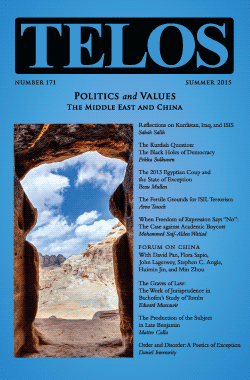Pekka Sulkunen’s “The Kurdish Question: The Black Holes of Democracy” appears in Telos 171 (Summer 2015). Read the full version online at the Telos Online website, or purchase a print copy of the issue in our store.
 The Kurdish Question is a continuation of violence, protest, and repression that persist from the unfinished national state-building of the early twentieth-century Europe. This article compares it with similar but more successful ones in the Nordic countries. The Kurdish Question depends on the democratization of Turkish society. There are black holes on both sides of the conflict that absorb efforts to build democratic institutions. Enlightenment critique of absolutism in Europe established the supremacy of the social over the political order. The republic represents the will of the people. Koselleck argued that this idea potentially drifts towards totalitarianism and brutalities: those who do not obey are excluded to the point of losing their human worth. This is the heart of the Kurdish Question in Turkey today. In democracy different groups defend their interests in political movements that attempt to rule by law. In the Kurdish Question negotiable interests have been identified and reforms are on the way. The problem is that symbolic black holes absorb efforts to negotiate into the requirement of unity and consequent inability to deal with difference. On the Turkish side, the unity is imposed by the secular and modern nationalism itself. On the Kurdish side it consists of a silence about differences in the Kurd society, which is still largely tribal but with a large population outside the clan system.
The Kurdish Question is a continuation of violence, protest, and repression that persist from the unfinished national state-building of the early twentieth-century Europe. This article compares it with similar but more successful ones in the Nordic countries. The Kurdish Question depends on the democratization of Turkish society. There are black holes on both sides of the conflict that absorb efforts to build democratic institutions. Enlightenment critique of absolutism in Europe established the supremacy of the social over the political order. The republic represents the will of the people. Koselleck argued that this idea potentially drifts towards totalitarianism and brutalities: those who do not obey are excluded to the point of losing their human worth. This is the heart of the Kurdish Question in Turkey today. In democracy different groups defend their interests in political movements that attempt to rule by law. In the Kurdish Question negotiable interests have been identified and reforms are on the way. The problem is that symbolic black holes absorb efforts to negotiate into the requirement of unity and consequent inability to deal with difference. On the Turkish side, the unity is imposed by the secular and modern nationalism itself. On the Kurdish side it consists of a silence about differences in the Kurd society, which is still largely tribal but with a large population outside the clan system.








